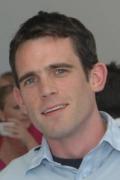Covering the Pacific Islands isn't a simple task. Each country has its own unique culture and broad issues. There are so many political stories, so many development stories and the whole region is a fast-growing focus for new investors as well as the competing world powers of the United States and China.
That’s why it was so helpful to actually be in Fiji last week for the UNESCO-founded World Press Freedom Day events.
They were organised by the University of the South Pacific’s journalism programme in the School of Language, Arts and Media (SLAM), with some admirable work done by the USP Journalism Students Association and the Fiji Media Watch organisation.
As Pacific Media Watch contributing editor, I was assisted by the Pacific Media Centre, as well as USP, and I spoke at the student events on campus as well as the official university event, which also featured the US Ambassador, Frankie A. Reed, a former journalist herself.
I learnt a lot from the students of the journalism school, often working away in their newsroom, with boards of previous student newspaper editors and prize-winners on the wall. It’s a who’s who of current media figures, and if the current "gang" working on Wansolwara continue to produce the sort of material such as the current edition, the awards should continue to come.
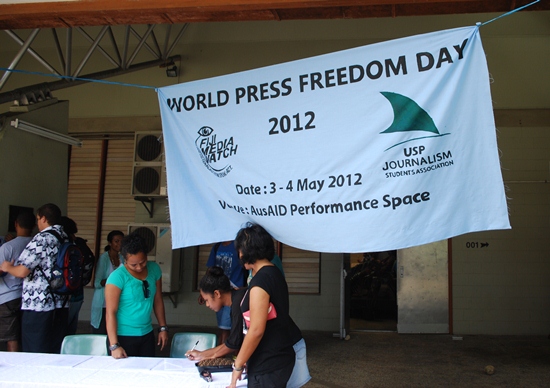
Dr Marc Edge is the head of journalism and hails from Canada, although he most recently left a post in at Sam Houston State University, Texas, to take on the role at USP. He is aided by former Fiji Times journalist Irene Manueli and other dedicated staff, who like their students, seem to spend a great deal of time in the newsroom, inculcating the habits and skills required for jobs in the "real" world.
The real world was mentioned by former Mai Life magazine journalist, Wansolwara editor and current student Dawn Gibson during a panel discussion organised by the students. But I was quick to point out that students can in fact lead the way in a situation Fiji is currently experiencing.
Testing boundaries
With the Public Emergency Regulations lifted in January, perhaps the students are the ones best placed to test the boundaries of the regime’s tolerance and will be able to get away with more than the mainstream press.
I gave the example of AUT University’s student journalists who covered the Pacific Islands Forum last year for Pacific Scoop and were praised for the depth and breadth of articles while the mainstream media were side-tracked by the Rugby World Cup.
The student journalists expressed their concerns in a frank discussion of the problems with the current media landscape, and there are more basic issues than state control of the press. Ronish Kumar, who has worked in a Fiji newsroom and recently returned from a student exchange in Canada, said conditions for journalists were a world apart.
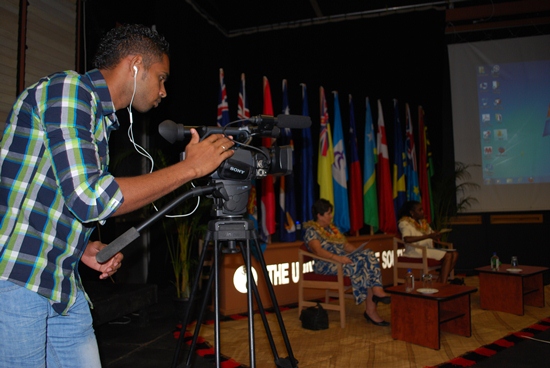
He complained of poor facilities, poor transport, and poor work tools in Fiji. Relating how his computer crashed as he completed his story, and without any success by the IT department to recover it, he said: “So the story was lost right there in the computer”.
The discussion was based around the problem of gaining access to information, although I also pointed out that access to information was one thing, and then how you deal with it is quite another. My comments about scrutinising information and press releases even from laudable NGOs and interpreting the information for the public were picked up by listening students and published in the Wansolwara edition.
A visiting Australian academic, Dr Ian Weber, contributed his thoughts to the discussion, making the point that good journalism takes “resilience, persistence, and time” echoing my argument that it is better to wait to get all sides of the story and do the background work before rushing to publication.
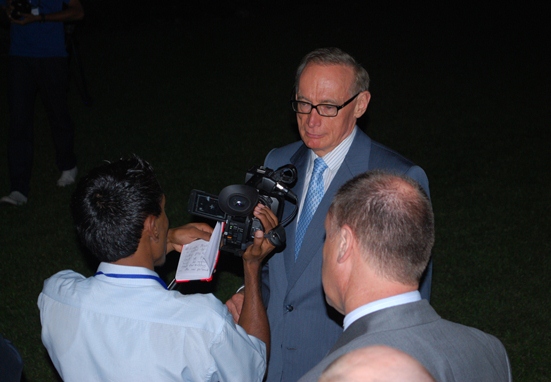
Earlier that day, the guest of honour was Suva lawyer and former journalist Richard Naidu, a well-known dissident and critic the regime. He spelled out that the new promised constitution was on a collision course with current laws. He mentioned the Media Industry Development Decree which has draconian punishments for journalists and organisations that don’t publish in the public interest, or the national interest.
Public interest?
“Who decides what is against the public interest or the national interest? That of course, is the government,” he said.
He also mentioned the new Media Code of Conduct, which also includes heavy fines for misdemeanours. An organisation only has a right of appeal for fines greater than $50,000. “If you are fined $49,000 you have no right to an appeal and an individual has no right to an appeal at all.”
Despite this threatening climate, Naidu was clear about his thoughts on the current Attorney-General Aiyaz Sayed-Khaiyum who has been described as the brains behind the government.
“He occupies the office of the Attorney-General, and when I say occupy, I mean occupy, like the Japanese occupied Manchuria.”
At that point, the president of the USP Journalism Students Association Faranisese Ratu turned to me with a look of concern, wondering if the Ministry of Information representatives were present among the media personnel.
But the following day both major newspapers had double-page spreads on the event, covering Naidu’s remarks and featuring comments from all parties including the Ministry of Information. It’s a sign that the past few years of PER has instilled a culture of intimidation that is hopefully lifting, for good.
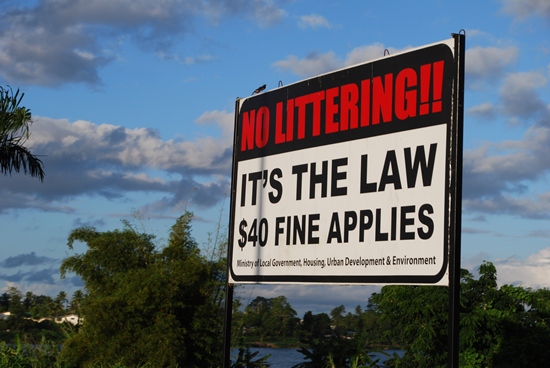
I was also able to meet the editors of those newspapers, the Fiji Times and the Fiji Sun. Their perspectives on their respective organisation’s approach were very interesting and helpful material for my masters thesis research. Fred Wesley of the Fiji Times described the “frustrating” experience for journalists whose articles were once censored from the newspaper edition by military censors, and he said he is encouraged by the improvement in that area. He recently defended the Times’ approach saying they were not pro-government or anti-government.
Development issues
That approach leads the Times to report less on government activity, but it also gives them an opportunity to focus on more development issues that affect the everyday person. Naidu heaped praise on the Times for doing just that.
Epineri Vula of the Fiji Sun defended himself against allegations that his newspaper was simply the mouthpiece of the government. He said it is only a perception, and it was better to cover the government than not to, and be forced to cover issues such as sports, which always have extensive coverage in the Times.
But back to the student concerns about work hours, demands and lack of resources – as these were the true concerns of the next generation of journalists. After a question about the meagre wages paid to journalists, one in the audience rose to comment – that she thought people went into journalism to make a difference, not for the money.
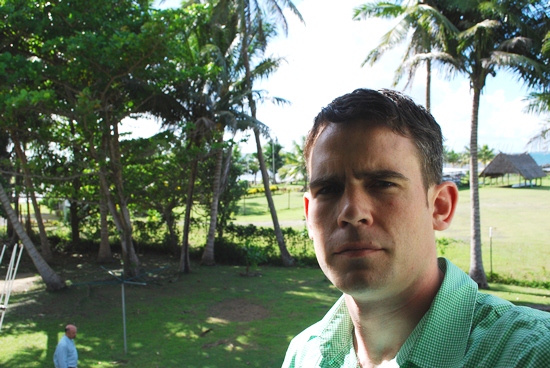
As Naidu had said earlier in the day: “Journalism is not a nine-to-five job. It’s a series of opportunities every day to tell people what they need to know and to give voice to their concerns.”
Here in New Zealand, we have our own media freedom issues, as explained in our AUT television production that I screened at the official event at USP. I argued that media freedom was no fait accompli in any country, no matter how democratic.
The USP students had their own production, a very professional 20-minute documentary on the recent Pacific Media Summit in Fiji, with an array of voices from all over the Pacific.
As I continue to cover media issues in the Pacific for Pacific Media Watch, and to complete my masters, I’ll be sure to follow developments in Fiji even more closely, now that I have been on the ground and spoken with so many people.
And I’ll be sure to be a more avid reader of that respected publication, Wansolwara.




